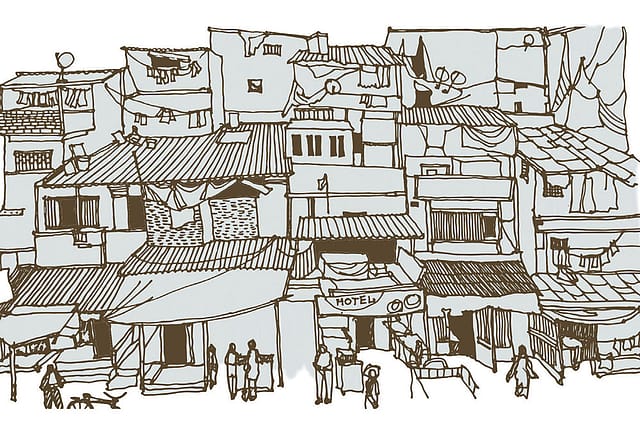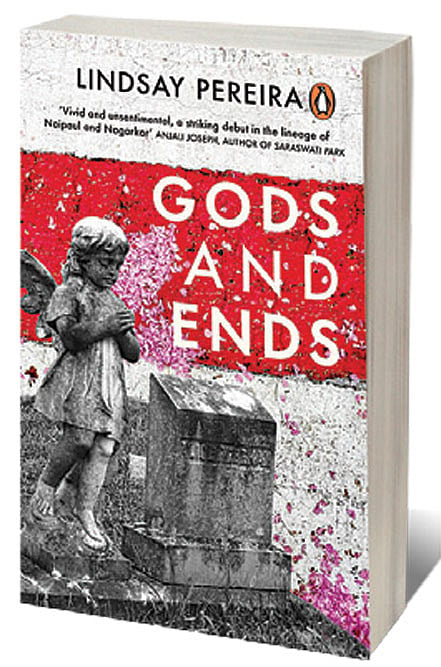A Prayer for Orlem

LIFE SEEMS TO BE a cesspool of misery, an endless curse, when you have nothing to look forward to. You try to while away your time, seeking solace in the fantasy of an elsewhere—perhaps the arms of a new lover, maybe a home away from the one you currently live in, or the idea of an afterlife in heaven, just about anything that promises to set you free.
This description might conjure up a picture of forced house arrest during a pandemic-induced lockdown. However, this is how most characters in Lindsay Pereira’s novel Gods and Ends live out their daily existence. They are tenants at the Obrigado Mansion in Orlem, a Roman Catholic parish located in Malad—a suburb of Mumbai.
They live in cramped rented spaces with paper-thin walls, a bossy landlord, and almost no privacy. Pereira writes, “There were no overhead or underground tanks for water, so tenants did what they could to store their share in plastic buckets or barrels, waking up daily at 5 am for the pitiful quota of a half-hour allocated to them by the municipality.”
Their suffering takes a variety of forms, including nostalgia, financial hardships, sexual repression, alcoholism, domestic violence, and sexual abuse. Pereira appears to know his characters intimately. He does not look at them with pity or condescension. Even when he writes about their hypocrisy, desperation and cruelty, there is compassion in his words.
Openomics 2026: Continuity and Conviction
06 Feb 2026 - Vol 04 | Issue 57
The performance state at its peak
The author has made a remarkable fiction debut with this book. His finest achievement is his utmost loyalty to the milieu his characters inhabit. Orlem may be unknown to many people outside Mumbai but is not a figment of Pereira’s imagination. It is known for its unique demographic composition—a mix of Goan, East Indian, Mangalorean and Tamil people.
This reviewer studied at a school in Orlem, and can vouch for Pereira’s attention to detail and authenticity. His portraits of life in Orlem are convincing because they draw upon his experience as an insider. He was born there, and spent over three decades in that place. Orlem is, most certainly, one of the main characters in this novel. It shapes everything.
One of the characters, Jude Sequeira, describes the setting in a colourful manner. He says, “Wot is here? Nothing. Two-three bleddy useless schools, one big church, three doctors who can’t tell their arseholes from their elbows, one dirty bleddy fish market, one nursing home where my daughter was born…and one graveyard for all dese fuckers to go to in the end.”
Pereira excellently captures the vocabulary and rhythms of speech that are characteristic of Orlem. The word ‘ask’ is often pronounced as ‘aks’ whereas ‘like that’ is uttered as ‘legdat’ and ‘Catholic’ becomes ‘Catlick’. The author is not making fun of them. He is documenting the creative use of a language that people have made their own.
The women in this novel are usually described in relation to the role they have been assigned in their families. Gracie is a wife, Bella is a widow, Philomena is a daughter, Dulcine is a daughter-in-law. The men, however, are mostly referred to in terms of their profession—Francisco is a landlord, Gilbert is a social worker, Xavier is a musician, and Lucian is a thug.
The patriarchy that is built into their lives condemns most of these women to a life of domesticity and service. They also get beaten, molested, and cheated on. Not surprisingly, they live in fear. Some secretly hope that their abusers will die.
Pereira shows that religion plays an important role in the lives of his characters. Though some draw strength from it, others use it to justify actions that pose a moral dilemma. Gilbert D’souza, for instance, convinces himself that adultery “wasn’t a sin if he was helping a grieving woman heal.” Pereira writes, “God wanted him to spread joy, not sorrow.”

